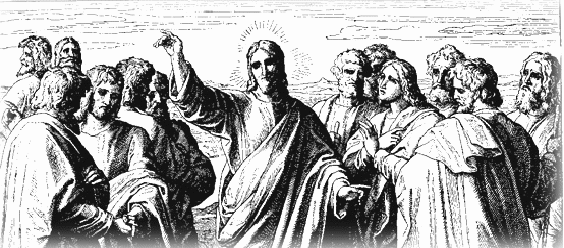
Part 2 Removing the Beam

Part
2 Removing the Beam
Christ’s Kingdom also baptized the people with its own ministers.1 They too must consent to and accept the authority of a king. They were franchised2 citizens of a different kingdom. They remained free men under God the Father, Who revealed His will to them in their hearts and minds by faith. All of this was under the leadership of the king called Anointed, Messiah, Christ, one Yeshua, a.k.a. Jesus.
This king was also tempted by power. The adversary of God’s freedom tempted Him with hunger,3 by the desire to manipulate,4 and by the desire to rule over all the kingdoms of the world. But He would put no one between allegiance and service to God the Father and Himself.5 He passed the test of temptations that all of the other kings and men had failed.
Both kingdoms had authority; both kingdoms had ministers who were supposed to work as public servants, fulfilling the daily ministration and attending to the families of the congregation of the people. Both had a system of governance, but were different.
In one, the voice of the people chose rulers who issued edicts and commands, made statutes, imposed taxes, had standing professional armies, and appointed courts, offered guaranteed benefits, signed treaties, and returned its members to the bondage of Egypt.
In the other kingdom, the people chose a king who redeemed them from edicts, commands, and laws imposed by Herod and his regulating legislature. They chose Yeshua. Christ allowed the people to return to the ways of charity and freewill offerings. He offered the benefit of God’s wisdom in a nation based on charity and love, rather than covetous control and oppression of neighbor. His ministers were true servants. He would make no agreement with or application to any other government or its appointed gods.
Pontious Pilate was the Proconsul of Rome. His decision was accepted as if Caesar had made it. Jesus would not appeal to Caesar because the Kingdom of Heaven was not a member of that world order and constitutional government.
Jesus answered, My kingdom is not of this world: if my kingdom were of this world, then would my servants fight, that I should not be delivered to the Jews: but now is my kingdom not from hence. John 18:36
God’s Kingdom had always been on this planet where two or more men walked in the ways of God. But God’s Kingdom was not a part of the Roman government. It had not lawfully gone under its authority, nor would Jesus apply to Caesar for his protection.
There are numerous words translated into “world” in the New Testament aeon,6ikoumen,7 ge8 and erets.9 The word “world” in the above verse is translated from the word kosmos, which means “an apt and harmonious arrangement or constitution, order, government.”10 It probably came from the word komizo, meaning “to care for, take care of, provide for” or “carry off what is one’s own,” which is what governments and the organized systems of men like Cain, Nimrod, Pharaoh, and Caesar did.
Jesus would not appeal to the Father of Rome, but only to the Father of the Kingdom of God. He also told us to appeal to Our Father in Heaven only. While He never said that His Kingdom was not on the earth, he did tell us to call no man Father upon the earth.11 Governments base much of their authority upon the right of Parens Patria. The Emperors of Rome assumed their authority as Father of the nation. The kingdom of Rome was made in God the Father’s image, but did not take on the character of His Name.
Jesus knew that the King of God’s Kingdom at-hand could not appeal or make leagues, treaties, and covenants with Rome or any other nation. Jesus trusted in the LORD and would not apply to nor pray to the gods of the Roman courts.
1John 4:1 When therefore the Lord knew how the Pharisees had heard that Jesus made and baptized more disciples than John,
John 4:2 (Though Jesus himself baptized not, but his disciples,)
2“Legal immunity from servitude, certain burdens, or other restrictions.” “To make free...”
3Matthew 4:4 But he answered and said, It is written, Man shall not live by bread alone, but by every word that proceedeth out of the mouth of God.
4Matthew 4:7 Jesus said unto him, It is written again, Thou shalt not tempt the Lord thy God.
5Matthew 4:10 Then saith Jesus unto him, Get thee hence, Satan: for it is written, Thou shalt worship the Lord thy God, and him only shalt thou serve.
6‘Aion’ means an unbroken age and is far more often translated into variations of the word age.
7‘oikoumene’ which originally meant “the portion of the earth inhabited by the Greeks, in distinction from the lands of the barbarians” it commonly has to do with inhabited.
8The word ‘ge’ is also translated world once but is translated earth about 188 times, land 42, ground 18, country 2. This is close to meaning planet earth
9‘erets’ from an unused root probably meaning to be firm; It is translated land 1543, earth 712, country 140, ground 98, world 4, way 3, common 1, field 1, nations 1, for a total of 2504. It means 1) land, earth, soil but not planet.
102889 kosmos (base komizo meaning “to care for, take care of, provide for; to take up or carry away in order to care for and preserve; to carry away, bear off”) n m AV-world 186, adorning 1; 187 1) an apt and harmonious arrangement or constitution, order, government...” Online Bible Greek Lexicon
11Matthew 23:9 And call no [man] your father upon the earth: for one is your Father, which is in heaven.